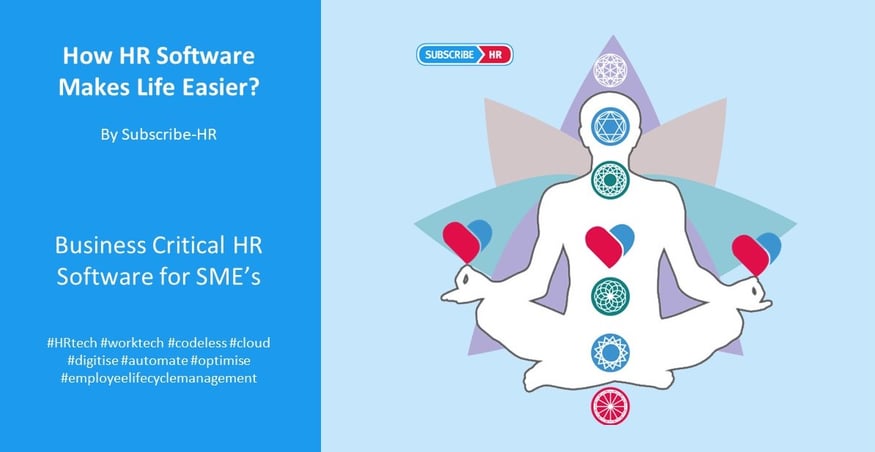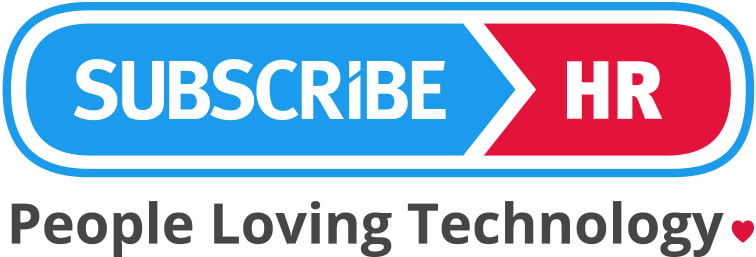As perceptions surrounding modern HR evolve, organisation leaders around the world are now starting to recognise its central role in driving strategic value within businesses.
That’s why so many companies are adopting HR software, as a way of seeing the advantages of well-executed HR come to life.
Human Resources Information System (HRIS) software is a centralised hub for employee information and activity. It serves as a platform for HR pros to manage all the tasks that would have usually taken hours to perform manually.
Beyond a simple database, HR software is a real powerhouse for recruitment, performance management, and other core HR functions.
In this blog post, we’ll be exploring all the ways in which HR software can make your life way easier as an HR professional. Keep reading to find out ⬇️
- Why you should be using HR software
- What exactly HR software does
- Some best practices to integrate HR software with your other systems and tools
- How to measure the ROI of HR tech
- All the many benefits of HR software

HR Software: Everything You Need to Know
Why use HR software?
In short, HR software simplifies processes, making people management effortless and efficient, saving considerable time for everyone involved. This is mainly because HR tech gives you the ability to hugely reduce the burden of manual administrative tasks, allowing you to focus on activities that enhance employee satisfaction and productivity.
HR software streamlines operations and accelerates processes that previously required extensive paperwork or spreadsheet management. It facilitates tasks such as holiday requests and approvals, ensuring seamless management of employee data and processes.
Ultimately, HR software empowers businesses to prioritise their employees' well-being and enables efficient management of human resources, driving organisational success down the line 👍

What does HR software do?
HR software is capable of simplifying an impressive range of HR-related processes by leveraging automated workflows and collaborative tools. It serves as a centralised repository for employee data, including personal information, employment details, performance metrics, and benefits.
HR software also does a great job of promoting administrative efficiency and enhancing employee information security. It allows HR teams to control employee data, accelerate document reviews, and ensure compliance with regulatory requirements.
Other tasks that HR software can automate include:
- Automating workflows and approvals
- Enhancing document management and tracking
- Improving administrative efficiency
- Ensuring compliance with regulations
- Facilitating disaster recovery initiatives
- Promoting employee information security
Can HR software integrate with other business systems and tools?
Traditionally, HR tasks were managed manually with disparate systems, leading to inefficiencies and data silos.
With today’s HR software, organisations now have centralised platforms that can integrate seamlessly with other systems, like:
- Accounting systems for seamless payroll processing, benefits administration, and financial reporting
- Project management tools for better resource allocation and alignment of human resources with project goals
- Applicant Tracking Systems (ATS) platforms to automate the recruiting process, from sourcing candidates to onboarding new employees
- Learning Management Systems (LMS) platforms to facilitate employee training and development
- Performance management software to track employee performance, set goals, and conduct performance reviews efficiently
- Time and attendance systems to automate time tracking, simplify payroll processing, and ensure compliance with labour regulations
- Benefits administration platforms to streamline the management of employee benefits, such as health insurance and retirement plans
- Communication tools like email and messaging platforms to improve internal communication and enhance employee engagement
- CRM systems to enable HR departments to track interactions with job candidates, manage recruitment pipelines, and improve candidate experience
- ERP systems for seamless sharing of employee data and streamlined cross-departmental processes

How can you measure the ROI of investing in HR software?
Small and medium-sized enterprises (SMEs) often grapple with quantifying HR's value due to its intangible nature.
However, there are several ways of measuring the ROI of HR tech, which all involve assessing the efficiency of HR initiatives on organisational performance.
Calculating ROI involves determining the cost savings derived from the software and dividing it by the total software cost, then multiplying by 100.
Additionally, other metrics such as time saved, cost of time, and improved productivity further contribute to comprehending the ROI of HR software.
💡 Want to find out more about measuring the ROI of HR tech? Read our full guide!
The Benefits of HR Software for HR Pros
As you may have got the sense by now, there are tons of benefits to using HR software. Beyond reducing your manual workload, tapping into HR tech can allow you to hugely level up your productivity and only perform the tasks that boost organisational success.
Let’s explore some of the most powerful real-world applications of HR tech ⬇️
More efficiency and productivity
The main benefit that HR professionals experience when leveraging HR software is a whole lot more efficiency and productivity across all their workload. Some examples include 👇
Candidate selection
HR software can leverage AI-powered platforms to sift through job applications so that only the most qualified candidates progress through the recruitment pipeline.
This can be especially helpful for resume selection, pre-hiring assessments, and background checks, saving valuable time and resources while still ensuring optimal candidate selection.
Performance management
Integrated HR software allows you to monitor key performance indicators in real time, giving you data-driven insights into employee productivity and project management.
You’ll get a huge productivity boost if you’re able to automate:
- Project milestones
- Task completion rates
- Resource allocation
- Feedback mechanisms
- Assessment of skills gaps
- Tracking of training completion
- Measurement of training impact on performance outcomes
Incentivising performance
Automating performance management means you’re able to reward employees based on predefined KPIs, creating a culture of recognition and motivation the easy way. This can look like 👇
- Implementing a system where employees automatically receive rewards or recognition when they achieve predefined performance metrics or milestones
- Digital scorecards that track employee performance in real time and automatically trigger incentives when specific targets are met or exceeded
- Implementing a system where bonuses are automatically calculated and distributed based on individual or team performance metrics
- Introducing gamification elements into performance management systems, where employees earn points, badges, or rewards for completing tasks, achieving goals, or demonstrating desired behaviours
- Developing individualised incentive plans for employees based on their specific performance goals, with automated tracking and adjustments as performance metrics evolve
- Establishing automated feedback mechanisms that provide real-time feedback to employees on their performance, along with suggestions for improvement and potential incentives for meeting or exceeding expectations

Better employee experiences
Today’s employee expects so much more in terms of their employee experience, and HR is having to come up with clever solutions to keep up and retain their employees.
HRIS systems are incredibly useful in bettering the employee experience by allowing HR pros to focus on the human aspect.
First of all, HR tech can hugely streamline all your onboarding and offboarding processes by:
- Automating paperwork and document management, reducing manual errors and delays associated with traditional onboarding processes
- Creating customised onboarding plans tailored to individual employees' needs and preferences
- Sending automated reminders and notifications to both HR and new employees, ensuring that everyone stays on track with onboarding activities
- Facilitating the effortless identification of training needs, managing training programmes and tracking employees' training progress and performance
Next, HR software does wonders to help keep employees engaged and motivated. It can:
- Provide real time feedback and recognition to help employees feel appreciated and valued within the organisation
- Allow for easy communication and collaboration
- Facilitate regular feedback, goal setting and performance tracking
- Offer self-service portals for employees to manage their own information, access training and engage with HR
More employee retention
More engaged employees means less employee turnover, and lots of cost savings for the organisation. This is much more easily accessible thanks to HR tech that offers the automation to streamline your employees’ experience 👇
Performance tracking
HR software provides comprehensive tools for monitoring employee performance. With comprehensive data sets, managers can identify tasks that employees enjoy and those they procrastinate on, allowing for more tailored workload distribution to maximise both productivity and satisfaction.
Calculating bonuses and fair compensation
Employees often leave due to a perceived lack of growth opportunities or appreciation. HR software assists in tracking and rewarding high-performing employees, ensuring their contributions are acknowledged and incentivised.
Learning and development
Continuous learning and development opportunities mean less burnout and maintaining employee satisfaction. HR software often includes features for organising training programs, facilitating workflow management, and integrating with learning management systems, promoting ongoing skill enhancement and career growth.
More openness and transparency
Lack of feedback and communication can lead to employee dissatisfaction. HR software promotes transparency by facilitating internal communication, peer-to-peer feedback sessions, and regular performance reviews. This open dialogue and visibility into organisational goals and performance will help you build trust and engagement among team members.

Tighter compliance
Compliance mistakes and oversights are often the product of human error. But with HR tech, organisations are able to maintain strict compliance at all times without adding more to HR pros’ workload 👇
- HR software generates compliance reports automatically, pulling data from centralised repositories and ensuring accuracy and timeliness in regulatory reporting
- Integrated compliance monitoring features can notify HR professionals of regulatory changes and deadlines, allowing them to proactively address compliance issues and avoid penalties
- HR software maintains an auditable trail of HR activities and transactions, providing evidence of compliance efforts and facilitating audits by regulatory authorities
Data security
Along with compliance, HR software really helps in keeping data secure, especially when it comes to employees’ data 👇
- HR software encrypts sensitive employee data and stores it securely in centralised databases with robust access controls and authentication mechanisms
- HR software implements role-based access controls, limiting access to confidential information based on employees' roles and permissions, preventing unauthorised access
- HR software automatically backs up employee data regularly, ensuring data integrity and resilience against data loss due to system failures or cyberattacks
Metrics and analytics
HR tech is a real goldmine of metrics you can then analyse to make more informed decisions. And if you play your cards right, your HR software will even analyse the data for you!
Customisable Dashboards for Business Critical HR Information Reporting
HR software offers customisable dashboards and reporting tools so that HR professionals can track key metrics and KPIs relevant to the organisation's goals and objectives
Predictive analytics
HR software is capable of leveraging predictive analytics algorithms to forecast workforce trends and anticipate future HR needs, enabling proactive decision-making and resource planning
Benchmarking capabilities
HR software provides nifty benchmarking capabilities, allowing HR professionals to compare their organisation's performance metrics against industry benchmarks and identify areas for improvement
Easier decision-making
With all these metrics, data and analytics capabilities in hand, decision-making becomes a lot easier thanks to HR software. With HR tech, you can leverage the following 👇
- Real-time access to accurate and relevant HR data
- Integrated collaboration features to facilitate communication and decision-making among HR teams and stakeholders
- Scenario planning and modelling so that you can evaluate the potential impact of different decisions and strategies on workforce outcomes before implementation

FAQs – Frequently Asked Questions
How can HR software benefit a company?
HR software benefits a company by streamlining HR processes and reducing administrative burdens. It also improves employee data management and security, enhances compliance with regulatory requirements, facilitates better decision-making through data analytics, and boosts overall efficiency and productivity within the organisation.
What are the advantages of HR technology?
The advantages of HR technology include:
- Automation of repetitive tasks, freeing up time for strategic HR initiatives
- Centralisation of employee data, leading to improved accuracy and accessibility
- Integration with other business systems, promoting seamless workflow and information sharing
- Enhanced compliance management, reducing the risk of legal issues and penalties
- Real-time reporting and analytics, enabling data-driven decision-making
- Improved employee experience through self-service portals and digital communication tools
How does HR technology affect HR roles?
HR technology transforms HR roles by shifting the focus from administrative tasks to strategic initiatives. It empowers HR professionals with data-driven insights for better decision-making and enhances collaboration and communication among HR teams and other departments.
Additionally, it enables HR professionals to deliver a more personalised and efficient employee experience, supports compliance efforts, reduces the risk of errors and oversights, and provides opportunities for upskilling and professional development.
In what ways could HRIS software make the HR department more efficient?
HRIS software can make the HR department more efficient by:
- Automating routine HR tasks such as payroll processing, benefits administration, and leave management
- Providing a centralised repository for employee data, documents, and records
- Streamlining recruitment processes through applicant tracking systems (ATS) and digital onboarding tools
- Enabling self-service functionalities for employees, such as updating personal information and accessing HR policies
- Facilitating real-time communication and collaboration among HR team members and stakeholders
- Offering advanced analytics and reporting capabilities for monitoring HR metrics and identifying areas for improvement

